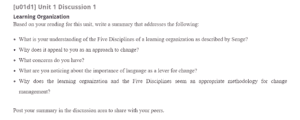Learning Organization
What is your understanding of the Five Disciplines of a learning organization described by Senge?
According to Senge (1997), many businesses never make it past their first few decades because of their inability to maintain continuous growth. Lack of constant learning makes it difficult for business organizations to sustain themselves in a competitive business environment for a long time. However, there are five disciplines of a learning organization that can help improve businesses’ sustainability. The five disciplines include personal mastery, systems thinking, developing mental models, shared vision, and team learning.
Do you need an initial version of “Learning Organization”? Reach out to us
Why does it appeal to you as an approach to change?
My understanding of the five disciplines of a learning organization is that learning occurs when it has been integrated into the organization’s culture. These factors make it essential for learning to be a part of the organization’s primary strategy. For instance, systems thinking requires that an organization integrates systems that support learning (Flood, 2002). The organization must also value learning by developing a workforce identifying with values encouraging learning. To implement the recommendations of Senge (1997), education needs to be a part of the organization’s culture.
What concerns do you have?
The concern I may have with this approach to organizational learning is the difficulty of developing a learning culture. It takes a lot of time and effort for an organization to establish the culture suggested by the five disciplines. This may not be a good solution for an organization that needs a quick fix for its learning issues. However, good change management can be of help to such organizations. Language, in particular, is an essential lever for change because it enables better communication of the importance and strategies for change to enhance the participation of all organization members in the change process.
Similar Post: Reaction to Team Development
References
Flood, R. L. (2002). Rethinking The Fifth Discipline: Learning Within The Unknowable. Routledge.
Senge, P. M. (1997). The Fifth Discipline. Measuring Business Excellence, 1(3), 46-51.
ORDER A PLAGIARISM-FREE PAPER HERE
We’ll write everything from scratch
Question 
[u01d1] Unit 1 Discussion 1
Learning Organization
Based on your reading for this unit, write a summary that addresses the following:

Learning Organization
- What is your understanding of the Five Disciplines of a learning organization described by Senge?
- Why does it appeal to you as an approach to change?
- What concerns do you have?
- What do you notice about language’s importance as a lever for change?
- Why do the learning organization and the Five Disciplines seem an appropriate methodology for change management?
Post your summary in the discussion area to share with your peers.
Response Guidelines
After your initial posting, review the posts of your peers. Respond to at least one of your peers’ postings with thoughtful, insightful, and helpful comments.
Resources
UNDERGRADUATE DISCUSSION PARTICIPATION SCORING GUIDE
Due Date: Wednesday weekly (Looking for DISTINGUISHED – set up your paper to hit each Topic)
PercenTopicof Course Grade: 30%.
DISCUSSION PARTICIPATION SCORING GUIDE
Due Date: Weekly.
Rate of Course Grade: 30%.
| Criteria | Non-performance | Basic | Proficient | Distinguished |
| Applies relevant course concepts, theories, or materials correctly. | Does not explain relevant course concepts, theories, or materials. | Explains relevant course concepts, theories, or materials. | Applies relevant course concepts, theories, or materials correctly. | Use examples or supporting evidence to analyze course concepts, theories, or materials correctly. |
| Collaborates with fellow learners, relating the discussion to relevant course concepts. | Does not collaborate with fellow learners. | Collaborates with fellow learners without relating the discussion to the relevant course concepts. | Collaborates with fellow learners, relating the discussion to relevant course concepts. | Collaborates with fellow learners, relating the discussion to relevant course concepts and extending the dialogue. |
| Applies relevant professional, personal, or other real-world experiences. | Does not contribute professional, personal, or other real-world experiences. | Contributes professional, personal, or other real-world experiences but lacks relevance. | Applies relevant professional, personal, or other real-world experiences. | Applies relevant professional, personal, or real-world experiences to extend the dialogue. |
Participation Guidelines
Actively participate in discussions. You should create a substantive post for each discussion topic to do this. Each post should demonstrate your achievement of the participation criteria. In addition, you should respond to the commands of at least two of your fellow learners for each discussion question—unless the instructions state otherwise. These responses to other learners should be substantive posts that contribute to the conversation by asking questions, respectfully debating positions, and presenting supporting information relevant to the topic. Also, respond toTopicfollow-up questions the instructor directs to you in the discussion area.
To allow other learners time to respond, you are encouraged to post your initial responses in the discussion area by midweek. Comments to other learners’ posts are due by Sunday at 11:59 p.m. (Central time zone).